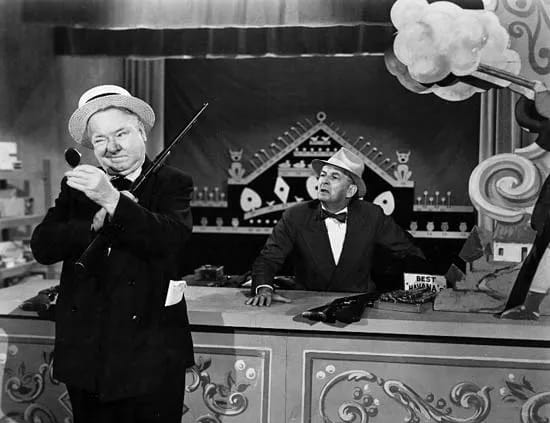close, but no cigar

The phrase close, but no cigar is traditionally uttered when someone falls just short of achieving a goal. The phrase comes to us from the early twentieth-century practice of giving out cigars as prizes for winning games of chance or skill at carnivals, fairs, and other attractions. The following description of the practice appears in Robert Machray’s 1902 book The Night Side of London. In the description, cigars are given out as prizes in what appears to be an early form of the game now known as Skee-Ball. As someone who spent my undergraduate summers as a boardwalk barker and operator of games of chance, I can attest to the accuracy of this description. Little has changed other than the cost of playing the game:
Another penny—and this time you accept defeat, and move on to the next stall, where another penny gives you the privilege of trying to roll three balls into certain holes with numbers attached thereunto. Should you score twenty you will win a cigar. But you do no more than score nine. Undiscouraged, or perhaps encouraged by this fact, you spend another penny, and another, and another—but you don’t get the cigar, and it is well for you that you don’t! For there are cigars and cigars. On you go, and next you try your hand at the cocoa-nuts, or the skittles, or the clay-pipes, or in the shooting-alleys. And so on and on—until your stock of pennies and patience is exhausted.
Another mention of the practice, this time with cigars being prizes for marksmanship, comes from the New York Evening World of 12 June 1905. The paper ran a contest whereby readers who managed to identify a man, “Mr. Raffles,” whose picture was published in the paper, as he went about town would win $100. The paper published after-the-fact descriptions of where Mr. Raffles had been:
Remember the young chap at the rifle range who nearly put the joint out of business winning cigars? Quite a crowd watched the sport, but all failed to grasp the fact that it was Raffles who was getting the smokers.
But the phrase close, but no cigar itself is not recorded until 28 May 1927, when it appears as a headline in the Yale Daily News of New Haven, Connecticut. The use is ironic:
Close but No Cigar
In a close and hard-fought pitchers’ battle the Sophomore delegation of Psi Upsilon defeated their classmates of Delta Kappa Epsilon, 25 to 1.
The next year it appears in a pair of articles in another Ivy League newspaper, the Daily Princetonian, the student newspaper of Princeton University in New Jersey. The first of these is from the 13 January 1928 issue:
The Triangle Club is a great institution and all that, but just the same we wish they would cut down a little on those wisecracks which are applicable to Campus life. Too many undergraduates are getting up “parties of four” to do various inane things, and just a few too many of our friends are telling us that “history will never know” that we forgot to go to Chapel Sunday. But the end of our patience will have come if Professor Cawley hands back a profusely red-inked essay with the sprightly remark, “close, but no cigar”.
The phrase seems to have been something of a catchphrase for the Princeton class of 1928, because this reunion notice for that class appears in the Princeton Alumni Weekly for 2 July 1929:
The long distance trophy, an appropriately inscribed silver cigarette case, was awarded to Em Gooch who had made the trip from Lincoln, Neb. for the occasion. Several other members came close, but no cigar, and we trust that all those in New York and Philadelphia who failed to show up, without reason, will read these lines with a quiver.
The Long Island Daily Press also had a couple of headlines that used the phrase that year, indicating that the phrase was not limited to Princeton. An 18 May 1929 article about a local Long Island man who came in second in successive elections for a local post had “Close, But No Cigar” as a sub-headline.
Then on 13 December 1929, the paper ran the a story about a local fundraising drive that included the following:
“Close—but no cigar!”
The refrain of the “knock ’em-down-and-win-a-smoke” barker still rings in the Christmas Fund Editor’s mind as he considers how close the Christmas Fund came yesterday to having a $200 day—only to miss by a scant half dollar.
So, by 1929 the phrase was well established.
Sources:
“’28’s First.” Princeton Alumni Weekly, 29.36, 2 July 1929, 1166/2. Google Books.
“Catch the Mysterious Mr. Raffles—Worth $100 to You,” Evening World (New York), 12 June 1905, 11/4. Library of Congress: Chronicling America.
“Close but No Cigar.” Yale Daily News (New Haven, Connecticut), 28 May 1927, 2/3. Yale Daily News Historical Archive.
Daily Princetonian (Princeton, New Jersey), 13 January 1928, 2/3. NewspaperArchive.com.
“Day’s Fund Just Falls Short of Reaching $200.” Long Island Daily Press (Jamaica, New York), 13 December 1929, 1/6. FultonHistory.com.
Goranson, Stephen. “‘close, but no cigar’ antedated (1929).” ADS-L, 18 January 2013.
Machray, Robert. The Night Side of London. Philadelphia: J. B. Lippencott, 1902, 103. Google Books.
Mullins, Bill. “‘close, but no cigar’ antedated (1929) (UNCLASSIFIED).” ADS-L, 18 January 2013.
O’Toole, Garson. “‘close, but no cigar’ antedated (1929).” ADS-L, 18 January 2013.
Oxford English Dictionary, additional sense, 2004, s.v. cigar, n.
Popik, Barry. “Close, But No Cigar.” The Big Apple (blog), 18 January 2009. BarryPopik.com.
Town Hall Joe. “Civic Gossip.” Long Island Daily Press, 18 May 1929, 16/6. FultonHistory.com.
Photo credit: Universal Pictures, 1941. Fair use of a single frame from a copyrighted motion picture to illustrate the topic under discussion.